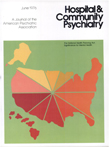Consumer-Professional Collaboration for Evaluation in Neighborhood Mental Health Programs
Abstract
Neighborhood mental health programs are challenged with the scientific and fiscal necessity of evaluating their services. Since most such programs are joint endeavors of neighborhood residents (usually a consumer board) and nonneighborhood professionals, such evaluative efforts require the sanction and collaboration of both groups to be maximally effective. However, the authors point out that collaboration is often strained by lack of trust and conflicts of interest. Study design may fail to consider neighborhood values, with the result that the provision of services is impeded, consumers are frightened or coerced, the role of paraprofessionals is threatened, and the consumer board's responsibilities to the neighborhood are ignored. The authors discuss those four issues and suggest ways of resolving them.
Access content
To read the fulltext, please use one of the options below to sign in or purchase access.- Personal login
- Institutional Login
- Sign in via OpenAthens
- Register for access
-
Please login/register if you wish to pair your device and check access availability.
Not a subscriber?
PsychiatryOnline subscription options offer access to the DSM-5 library, books, journals, CME, and patient resources. This all-in-one virtual library provides psychiatrists and mental health professionals with key resources for diagnosis, treatment, research, and professional development.
Need more help? PsychiatryOnline Customer Service may be reached by emailing [email protected] or by calling 800-368-5777 (in the U.S.) or 703-907-7322 (outside the U.S.).



